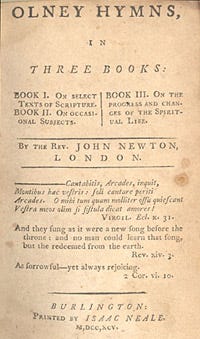All Glory goes to Creator God Jesus My King My Lord and My God For Everything Always!
TurtleDove
The traditional Hymn Amazing Grace sung by TurtleDove aka Michelle Katherine Orts
Vocals: Michelle Katherine (Meyer) Orts
Piano Arrangement and Peformance: Douglas R. Canal
Lyrics
Amazing Grace, Oh How Sweet the Sound - That saved a wretch like me - I once- Was lost - Oh but now- I'm found Once was blind but now- Now I see.
Twas Grace that taught my heart to fear - And Grace my fears relieved - Oh how precious did - Did that Grace Appear - The Hour - I first - - O first believed
Through Many Dangers, toils - Toils and snares - I have already come - With Grace has brought - Has brought me Safe thus far - And Grace - Sweet Sweet Grace will Bring Me Home
Must Jesus Bear His Cross Alone? And all the world go free? No! No! There's a cross for each and everyone and there's a cross for you - For you and me..............*
*Additional (Catholic) Verse
When we've been there ten thousand years bright shining as the sun. We've no less grace than to sing God's Praise then when we've first begun!
John Newton wrote the words to "Amazing Grace" in 1772. It was not for another 60 years that the text was wed to the tune to which it is sung today.
Olney Hymns in Three Books was published in London in 1779, containing only the words to hymns that were linked to specific sermon themes and Biblical references. The publication of hymns in this fashion--that is, without specific melodies and accompaniments--was commonplace in Newton's day. Each congregation adapted the words to well-known songs or hymn melodies whose musical rhythms matched the poetic meter of the text. [ 1 ] It is easy to see, for example, how "Amazing grace! (how sweet the sound)" can be sung to the same tune as the words of another popular hymn, "There is a land of pure delight."
Authors such as Newton who published hymnals with text only were able to stress the importance of the ideas and themes that their poems expressed. Also, on a practical level, these hymnals were far more economical to publish and sell because the process of printing music bore additional costs.
After debuting in Olney Hymns, "Amazing Grace" soon appeared in other hymn collections in England, but it flourished in America. In 1787, Newton's Olney Hymns was published in New York, in 1791 in Philadelphia, and in 1795 in New Jersey. It was included in a Reformed Dutch Church hymnal in New York in 1789, and the Baptists issued the text in Hymns and Spiritual Songs, published in Virginia, in 1793.
"Americans took the song into their hearts," wrote Steve Turner in his chronicle of the hymn's history. [ 2 ] Americans added further stanzas to Newton's poem and eventually set it to the simple, accessible melody by which it is now known throughout the world.
By the early 19th century, the Reform, Baptist, and Congregationalist churches in America were among those that had adopted "Amazing Grace" into their worship service. This interdenominational appeal, Turner notes, may well have been the result of the hymn's popularity during the Great Awakening of the 1820s and 1830s, a widespread religious movement that found its greatest expression in camp revival meetings. Further dissemination came when the song was published in shape-note hymnals.
Once Newton's text became linked to a notated tune, the emphasis shifted from the words to its music. This specific tune, known as "Harmony Grove," also was employed for "There is a land of pure delight," the hymn text cited above.
The melody for "Amazing Grace" is based on the pentatonic or five-note scale (heard by striking the five black notes on a piano); in fact, in its earliest form, the melody employed only these five pitches. Refinements to the tune are attributed to William Walker, who in 1835 entitled it "New Britain" and published it in a book of hymns entitled The Southern Harmony. This collection was reprinted four times during Walker's lifetime; it sold an estimated 600,000 copies. By the Civil War, as Turner notes, "Amazing Grace" was a vital part of American life." [ 3 ]
Although Newton's poem on its own speaks masterfully of the soul's journey to salvation, it found its most powerful expression when set to Walker's elegant and simple hymn tune. From the pen of a curate in the English countryside, "Amazing Grace" became a beloved anthem expressing personal and communal optimism, fulfillment, and deliverance.” Source: Library of Congress “The Dissemination of Amazing Grace”
Song of Solomon 2: 11-12
“11 For, behold, the winter is past; the rain is over and gone.
12 The flowers appear on the earth; the time of the singing [of birds] has come, and the voice of the turtledove is heard in our land.”







Amazing Grace!